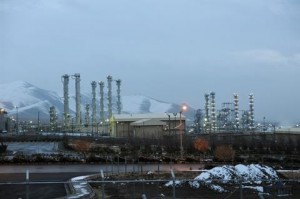 (Reuters) - Legislation introduced by a bipartisan group of U.S. senators on Wednesday would block Iran's access to billions of dollars worth of foreign currency reserves in the latest congressional effort to slow development of the Islamic Republic's disputed nuclear program.
(Reuters) - Legislation introduced by a bipartisan group of U.S. senators on Wednesday would block Iran's access to billions of dollars worth of foreign currency reserves in the latest congressional effort to slow development of the Islamic Republic's disputed nuclear program.Lawmakers in Washington say the government in Tehran taps the reserves held in banks around the world, mostly in euros, to get around U.S. and EU sanctions on oil sales that have damaged Iran's economy.
Iran�converts the reserves it built up from decades of selling oil, estimated to be worth $60 billion to $100 billion, into local�currencies�in order to finance imports and stabilize its budget, the lawmakers say.
The United States and the European Union believe that Iran is enriching uranium to levels that could be used in nuclear weapons. Tehran says the program is intended for producing power and medical supplies.
If passed, the bill introduced by Senators Mark Kirk, an Illinois Republican, Joe Manchin, a West Virginia Democrat, and three others, would block such currency conversions of the reserves and be retroactive to May 9.
Financial institutions around the world are "on notice" to halt all foreign currency transactions on behalf of blacklisted Iranian banks and sectors "or risk being cut off from the U.S. financial market," the lawmakers said in a statement.
The bill seeks to limit the ability of the Central Bank of Iran and National Iranian Oil Company to conduct transactions in foreign�currencies. It authorizes President Barack Obama to impose sanctions on foreign banks that conduct such transactions.
Mark Dubowitz, head of the Foundation for Defense of Democracies and a proponent of tough sanctions on Iran, said the bill could push European regulators to take their own actions to cut Iran's access to euros.
"Congress is encouraging the European Union to adopt a made-in-EU solution that prevents Iran from really exploiting a European loophole," he said.
Kirk and Manchin's legislation builds on a sanctions law that took effect on February 6, and prohibits Iran from repatriating�earnings�it gets from its oil exports.
The earnings are kept in special accounts in countries that buy Iranian oil. The system aims to force Iran to spend the earnings on goods from those countries, keeping the money from benefiting its nuclear program.
The bill is expected to be attached later this month to Iran sanctions legislation in the House of Representatives that was introduced in February by Ed Royce, the chairman of that chamber's foreign affairs committee.
By Reuters
The Iran Project is not responsible�for the content of quoted articles.










